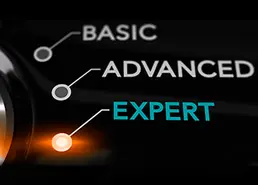CodeMeter License Portal - Self-Service Licensing for Every Business Model
What is CodeMeter License Portal
CodeMeter License Portal is the customizable, browser-based self-service extension of CodeMeter License Central. It empowers software vendors, resellers, enterprises, universities, and individual end users to activate, deactivate, restore, and assign licenses without vendor intervention. Designed for scenarios from B2C and B2B to B2E and academic licensing, CodeMeter License Portal adapts to your branding, integrates with your existing systems, and supports flexible business models with robust security and precise control.
The Challenge: Complex Licensing, High Support Overhead
Managing licenses across diverse markets — from single consumers to multinational enterprises — can quickly become complicated. Manual processes are slow, error-prone, and create friction for both vendors and end users. Without a central, automated system, vendors lose valuable time on routine support tasks, miss opportunities for upselling, and risk customer frustration due to delayed activations, inconsistent access, or cumbersome workflows.
The Solution: Self-Service Licensing, Full Control
CodeMeter License Portal transforms licensing from a vendor-driven, support-heavy process into a scalable, customer-friendly system. Extending your CodeMeter License Central environment, it gives vendors and end users the power to activate, deactivate, restore, and assign licenses on their own — with role-based permissions, hierarchical structures, and API integration to your business systems. The result: faster deployments, lower support costs, improved compliance, and a better customer experience at every touchpoint.
Key benefits include:
-
Customer Self-Service: Empower end users to activate, deactivate, and restore licenses instantly, reducing support overhead.
-
Flexible Business Models: Manage B2C, B2B, B2E, reseller, and project-based licensing with granular role and group structures.
-
Hierarchical Organization: Structure customers, resellers, and teams in up to 10 levels for precise license assignments.
-
Multi-Container Support: Seamlessly manage CmActLicenses, CmDongles, Personal CmCloudContainers, and Enterprise CmCloudContainers.
-
Workflow Automation: Integrate with ERP, CRM, and e-commerce systems via API for license creation, distribution, and reporting.
-
Corporate Branding: Adapt the portal’s look & feel to your brand with white-label options and SSO integration.
-
Proactive Notifications: Configure alerts for expiring licenses, excessive restoration requests, or new group invitations.
Product Features
Built to combine flexibility with ease of use, CodeMeter License Portal offers a comprehensive set of functions for vendors, resellers, and end users alike. These include:
-
Self-Service Portal: End users can manage their own licenses.
-
SSO Integration: Default integration available; customizations possible via Wibu-Systems Professional Services.
-
Customizable Corporate Design: Match your brand identity.
-
Hierarchical Management: Up to 10 levels of resellers, customers, and subgroups.
-
Activation & Deactivation: Directly via CodeMeter License Central.
-
License Grouping & Assignment: Allocate licenses to users, groups, or projects.
-
Support Processes: Automated workflows for lost licenses or transfers.
-
Multi-Container Management: Local (CmActLicense), mobile (CmDongle), Personal CmCloudContainer, and Enterprise CmCloudContainer.
-
License Project Management: Prepare and lock configurations for complex deployments.
-
Integrated License Models: Pre-configured support for the 7 most common licensing models.
-
Role-Based License Creation & Reporting: Allow authorized users, resellers, or customers to generate licenses within defined roles, with reporting tools to track and analyze issued licenses.
-
Configurable Notifications: Email, in-portal, or API-driven alerts.
Key Use Cases
B2C – Simplifying End User License Management
End users register once, add tickets to their account, and access all their licenses without tracking multiple keys. They can activate, deactivate, and restore licenses independently, ensuring availability and security while reducing vendor support workload.
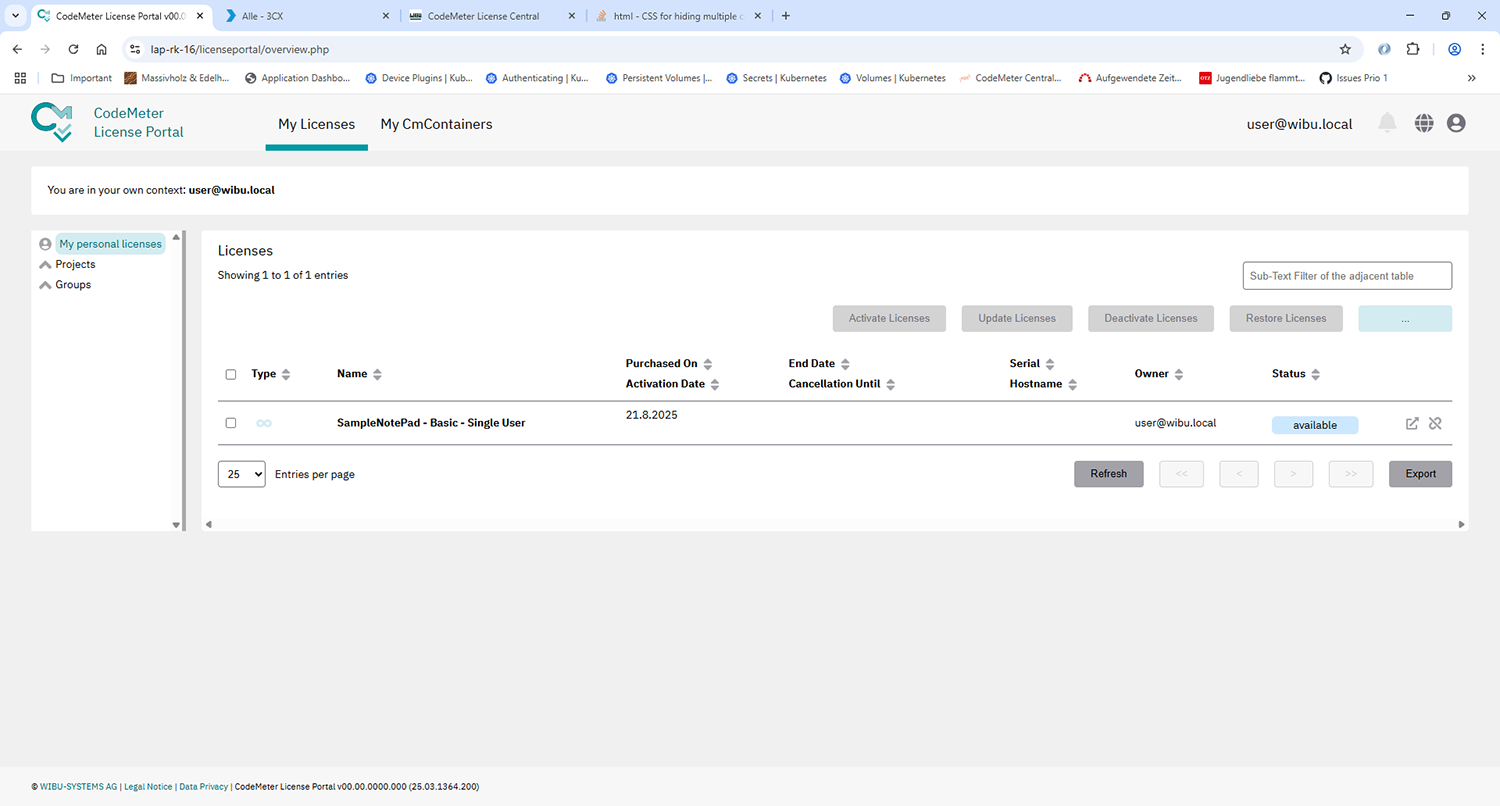
B2B / B2E – Empowering Enterprise Administrators
Administrators can create accounts, structure teams, and assign/revoke licenses instantly, while maintaining oversight. SSO integration streamlines onboarding, and hierarchical structures enable precise allocation across departments or subsidiaries.
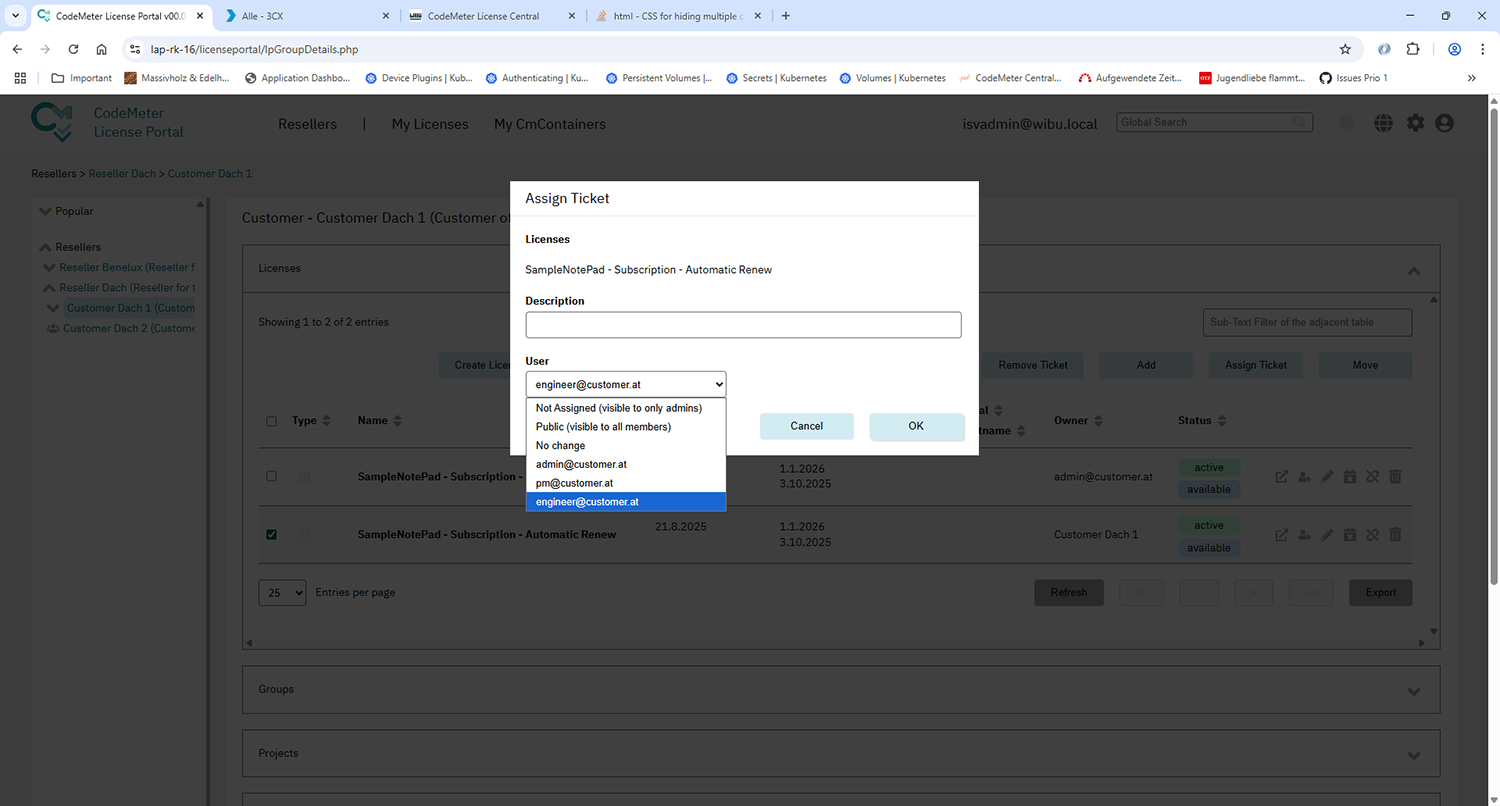
Reseller Networks – Extending Your Reach
Resellers can issue, distribute, and manage licenses directly, within your controlled framework and branding. This decentralization scales operations and strengthens reseller relationships.
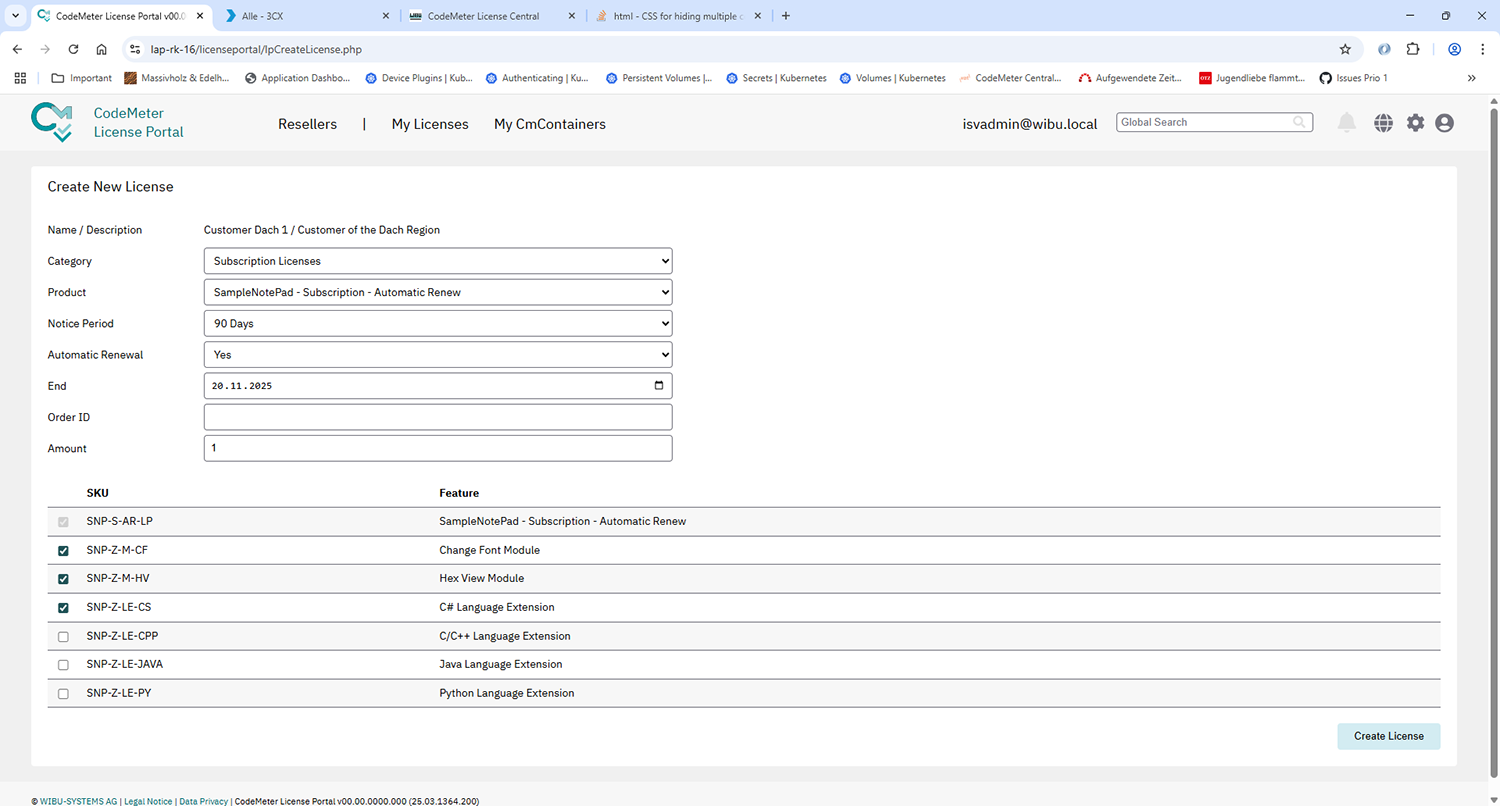
CmCloudContainer Management – Simplifying Access Anywhere
Personal CmCloudContainers for individuals and Enterprise CmCloudContainers for servers or groups are created automatically. Administrators manage licenses centrally, while users import them to their devices for instant cloud access.
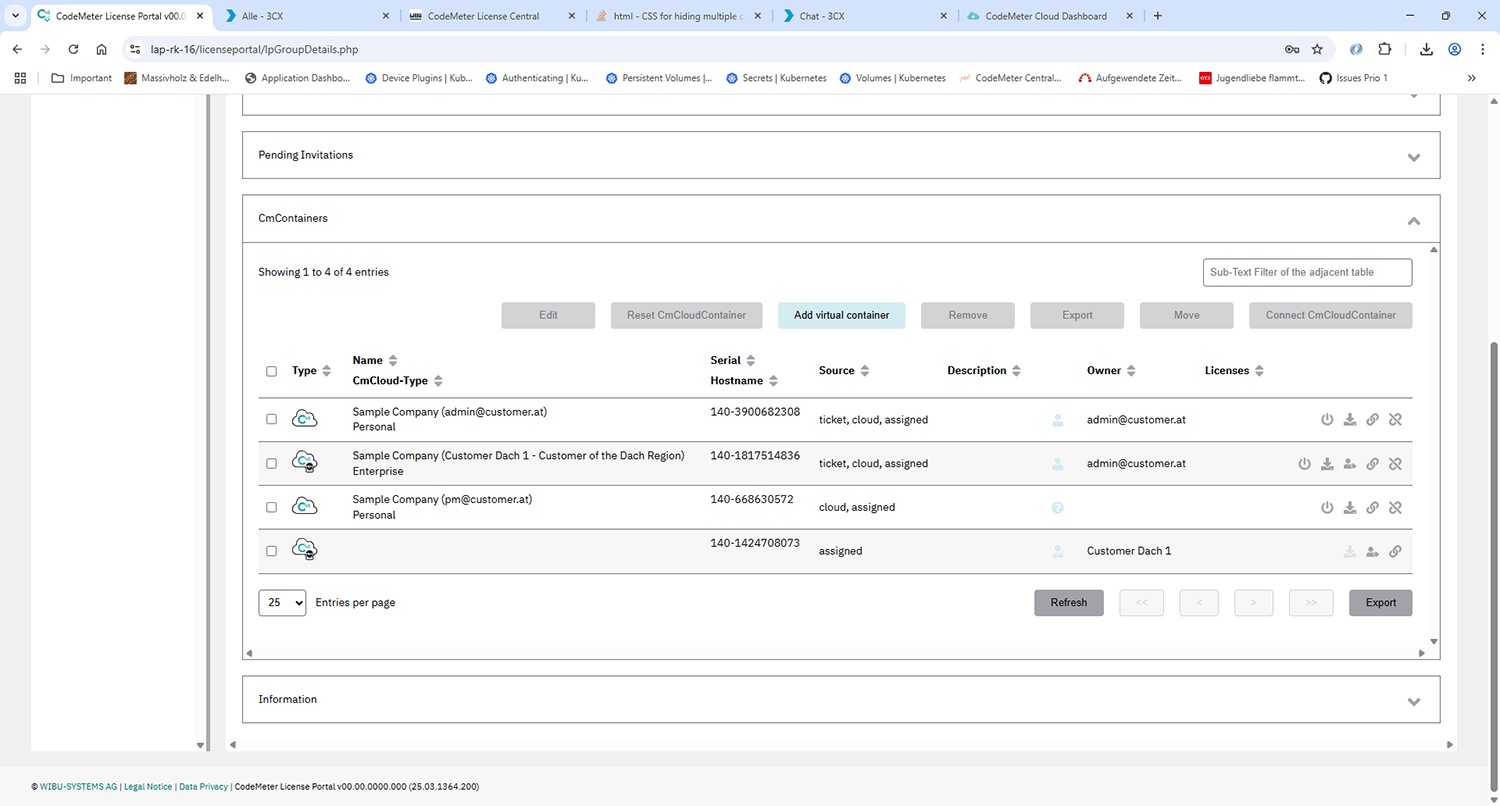
Editions & Feature Comparison
Elements | Basic | Professional | Enterprise |
|---|---|---|---|
User Group Levels | 1 | 2 | 10 |
User Management | |||
Customer Management (incl. License Creation in Portal by ISV) | |||
Reseller Management (incl. License Creation in Portal by Reseller) | – | ||
CodeMeter Cloud Support | |||
White Labeling (Logo, Colors, Legal Notice, Copyright) | |||
Activation API (by user via Gateway) | |||
License Creation API (via Connectors) | – | ||
Management API (Groups, Containers, Licenses, …) | – | ||
Custom Plugins and Configuration | – | ||
SSO Integration | – | ||
Multi-Vendor Activation (Integration of third-party License Portal) | – | – | |
Project Workflow | – | – | |
Notification Dispatcher (customized) | – | – | |
Custom Development | – | – | |
Test Instances | – | DEV | DEV + Q |
Additional Technical Information
Roles and Assignments
Different roles can be defined in CodeMeter License Portal. A group administrator can create, modify, and delete accounts, subgroups, and projects, and assign or revoke licenses.
In B2C scenarios, licenses are typically personal (assigned to individuals). In B2B scenarios, licenses can be assigned to a person within a group, to a group itself, or to a project. Licenses assigned to individuals are visible to both the group administrators and the individual. Licenses assigned to groups or projects can be marked as “public” (visible to all members) or “admin only” (visible only to administrators).
License Operations
Users can activate and deactivate their own licenses. Deactivation can be disabled by the software vendor for all or specific licenses.
Notable features include support processes for lost licenses or license transfers. The software vendor defines the rules for when users can help themselves — for example, whether licenses may be transferred to another container even if the original container is unavailable. All actions are logged, and anomalies can be analyzed through reporting.
License Containers
CodeMeter supports license containers in the cloud, on local computers, and on mobile dongles. All of these can be managed with CodeMeter License Portal.
Particularly noteworthy is cloud container management:
-
Individuals automatically receive a personal CmCloudContainer.
-
For license servers, a technical user account can be created, which automatically receives an Enterprise CmCloudContainer. The administrator can manage it, activate/deactivate licenses, and make them available via a license server.
-
Groups also automatically receive an Enterprise CmCloudContainer. Group administrators can activate/deactivate licenses, and all group members can import the container to their local machine to use these cloud-based licenses directly.
License Creation
Through a role-based system, the software vendor can allow employees, resellers, and customers to create licenses themselves. Products are assigned to specific categories, and roles are defined for each category. Administrators with the corresponding role can create licenses for the relevant products within their group.
Typical use cases include demo versions, customers with framework agreements, and resellers.
-
Demo versions
-
Customers with framework agreements
-
Resellers
Created licenses can be analyzed via reporting and, if necessary, billed through an external system.
Notifications
A messaging module can display individual messages, for example:
-
Invitations to join another group
-
Impending license expiration
-
License expiration
-
License activations and deactivations
-
Excessive use of the recovery function
Notifications can be shown in CodeMeter License Portal, sent via email, or transmitted to a third-party system.
License Projects
For complex licensing structures, there are use cases where a license administrator prepares the license setup, and an on-site colleague should not be able to change it. For such cases, CodeMeter License Portal offers license project management.
An administrator creates a project with virtual license containers, configures the licenses, and publishes the project. On-site, the virtual containers are transferred to real containers. If the project needs to be modified later, the administrator switches it back to “edit mode,” makes the changes, and republishes it. On-site colleagues can then retrieve the updated configuration. If an internet connection is available, updates can also be fetched automatically via the Activation Wizard.
License Models
In CodeMeter License Central, all license options are available as technical parameters, allowing the software vendor to define any licensing model manually.
In CodeMeter License Portal, the seven most common license models are pre-implemented as simple options:
-
Perpetual single-user licenses
-
Perpetual multi-user licenses
-
Single-user subscription
-
Multi-user subscription
-
Demo licenses
-
Prepaid time-limited licenses
-
Internal and Not-for-Resale (NFR) licenses
These models can be created, configured, and used immediately without in-depth CodeMeter expertise. Individual features can also be defined and activated separately within these models.
Integration & API
The REST-like API enables:
-
Embedding activation workflows directly in protected software (Software Activation Wizard)
-
Triggering license creation from ERP, CRM, or e-commerce systems
-
Assigning and removing licenses for groups and users
The interactive API Guide provides documentation and allows live API calls without third-party tools. Access is secured with a login token.
Technical Requirements
Server
-
SaaS: CodeMeter License Central 4.22+ (minimum: Dedicated Server)
-
On-Premise: CodeMeter License Central Internet Edition 4.22+, Docker or Kubernetes
-
20 GB HDD (50 GB recommended), 2 GB RAM (4 GB recommended), 1 CPU (2 recommended)
Client
-
No local installation required; any modern HTML5 browser
-
For direct activation: CodeMeter Runtime 7.10a+ and browser with WebSocket support (Firefox, Chrome)
Frequently Asked Questions
Yes. The REST-like API allows you to create and assign licenses directly from any third-party system, such as ERP, CRM, or e-commerce platforms.
Yes. You can grant individual resellers permission to create all, or a specific subset, of available licenses.
Yes. A default SSO integration is available and can be activated easily. If you need additional functionality, such as managing user rights through SSO, Wibu-Systems’ Professional Services team can provide the necessary customization.
Technically, there is no inherent limit. The Enterprise Edition of CodeMeter License Portal supports up to 10 levels.
No, this is not recommended. In the default configuration, tickets containing multiple licenses are split during import. Only complete tickets can be assigned to users or groups. This ensures users see all licenses assigned to them without needing to track ticket details.
You can choose from several strategies:
- CodeMeter License Portal as the primary system: Create, modify, and cancel subscriptions in the portal, then generate invoices from periodic reports.
- Third-party system as the primary system: Create and renew subscriptions via the API.
- Sell time contingents: Allow users to activate them freely.
You can invite an existing user to multiple groups. The user will then have access to licenses from all groups they belong to.
Yes. This can be done via the API by creating an import script to generate groups and/or users and assign the existing licenses to them. Feasibility depends on the source and quality of the exported data. The script can be created by your own development team or by Wibu-Systems’ Professional Services team.
- Personal CmCloudContainer: Assigned to individual users, typically for single-user licenses.
- Enterprise CmCloudContainer for technical users: Assigned to license servers or floating network licenses, managed by a group admin.
- Enterprise CmCloudContainer for groups: Used for floating network licenses without a local license server. Managed by a group admin; accessible to all group members.
Access includes all operations such as creation, reset, modification, and deletion:
- An ISV admin can access any CmCloudContainer.
- A user can access their own Personal CmCloudContainer.
- A group admin can access the Personal CmCloudContainers of all members in their group and subgroups.
- A user can use any Enterprise Group CmCloudContainer for groups they belong to.
- A group admin can access any Group CmCloudContainer in their group and subgroups.
- A group admin can access any Technical User CmCloudContainer for technical users in their group and subgroups.
Ready to Experience Self-Service Licensing?
Get hands-on with CodeMeter License Portal today.
Want to see how it works in practice? We’ll provide you with access to the CodeMeter Evaluation Portal — a dedicated environment that mimics the full CodeMeter License Portal and lets you explore all its functionalities.
Test license activation, deactivation, restoration, role-based management, and API integrations in a secure sandbox before you roll it out to your customers.
Contact us now to request your CodeMeter Evaluation Portal access and start exploring!



